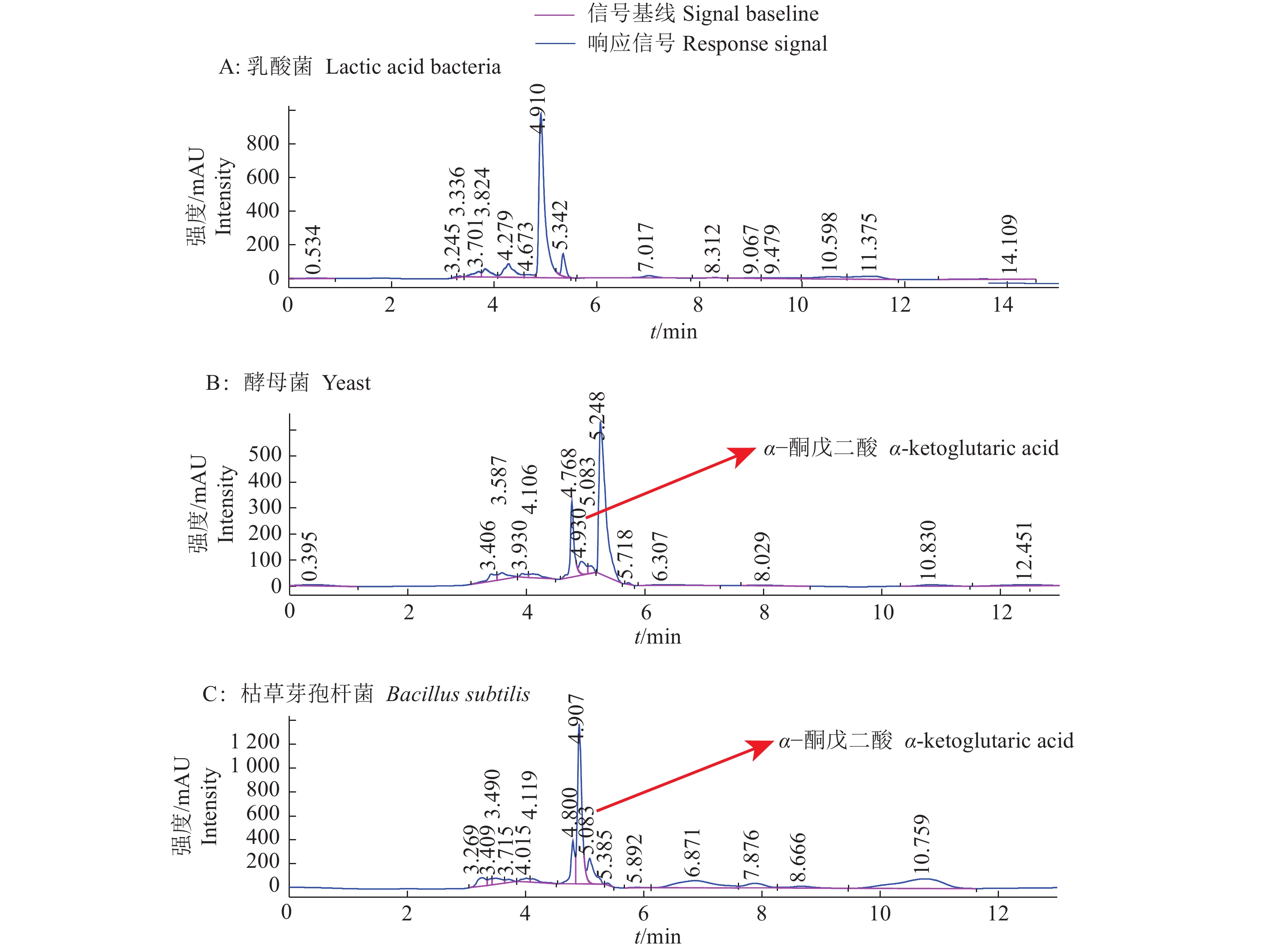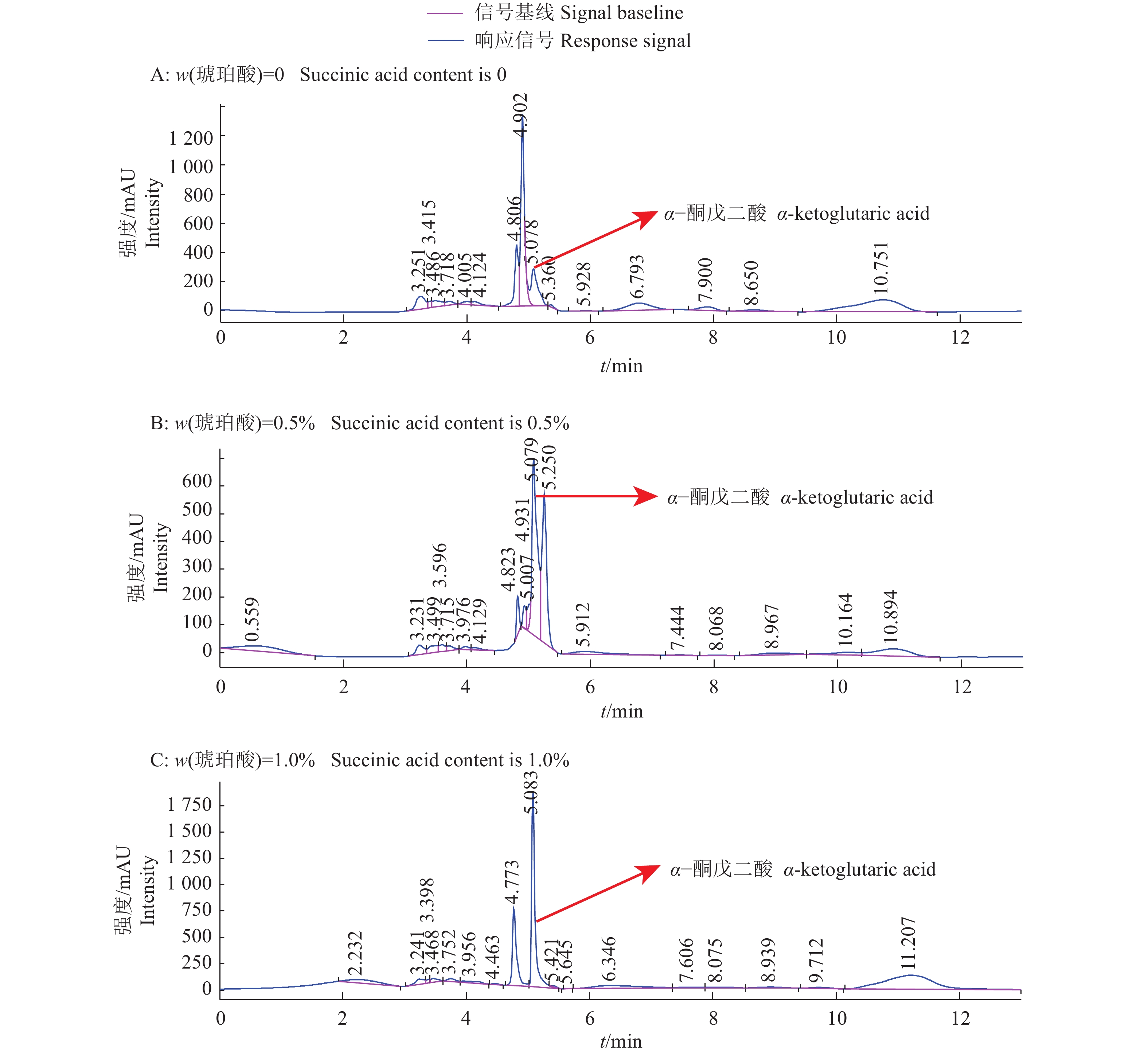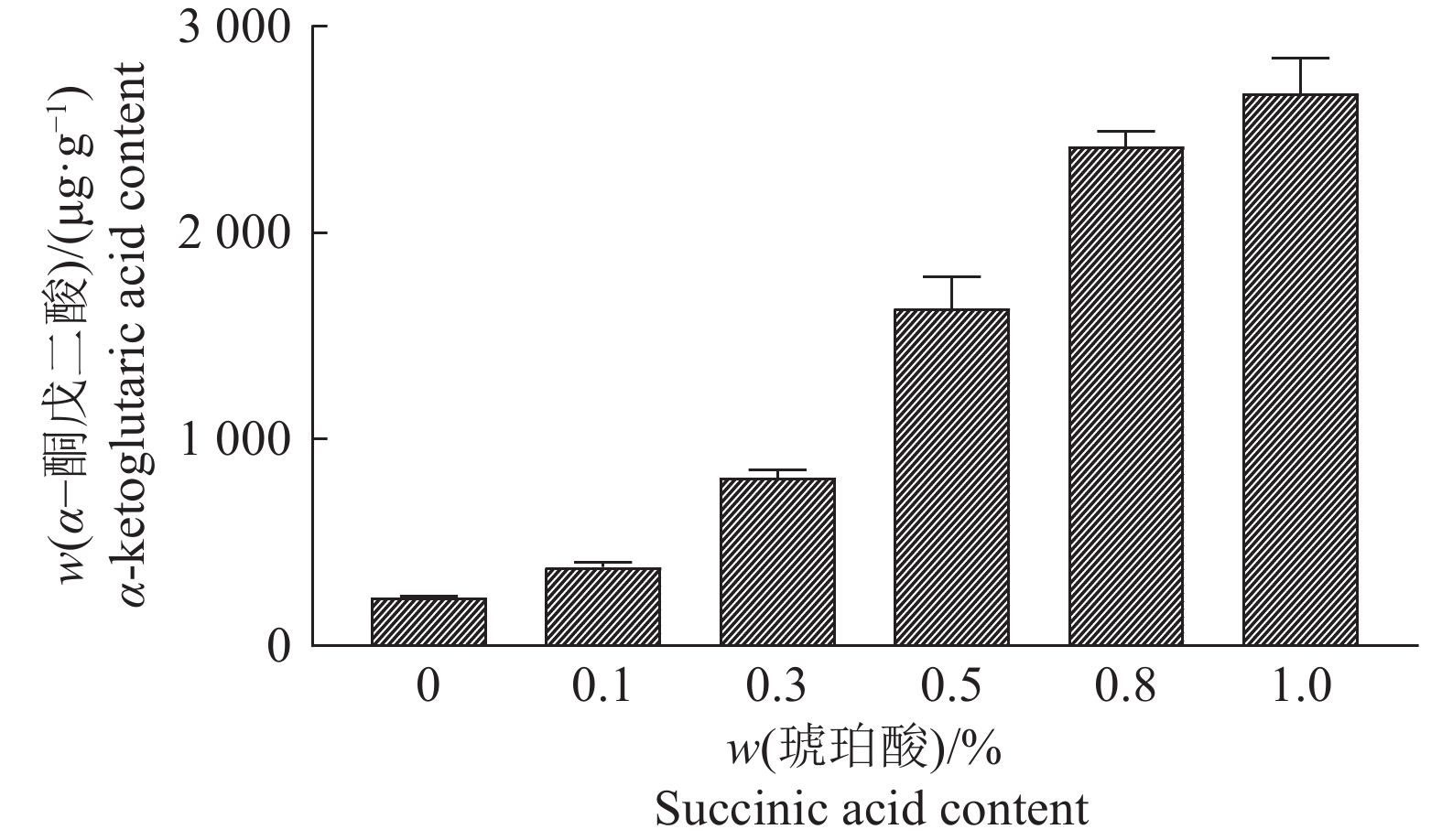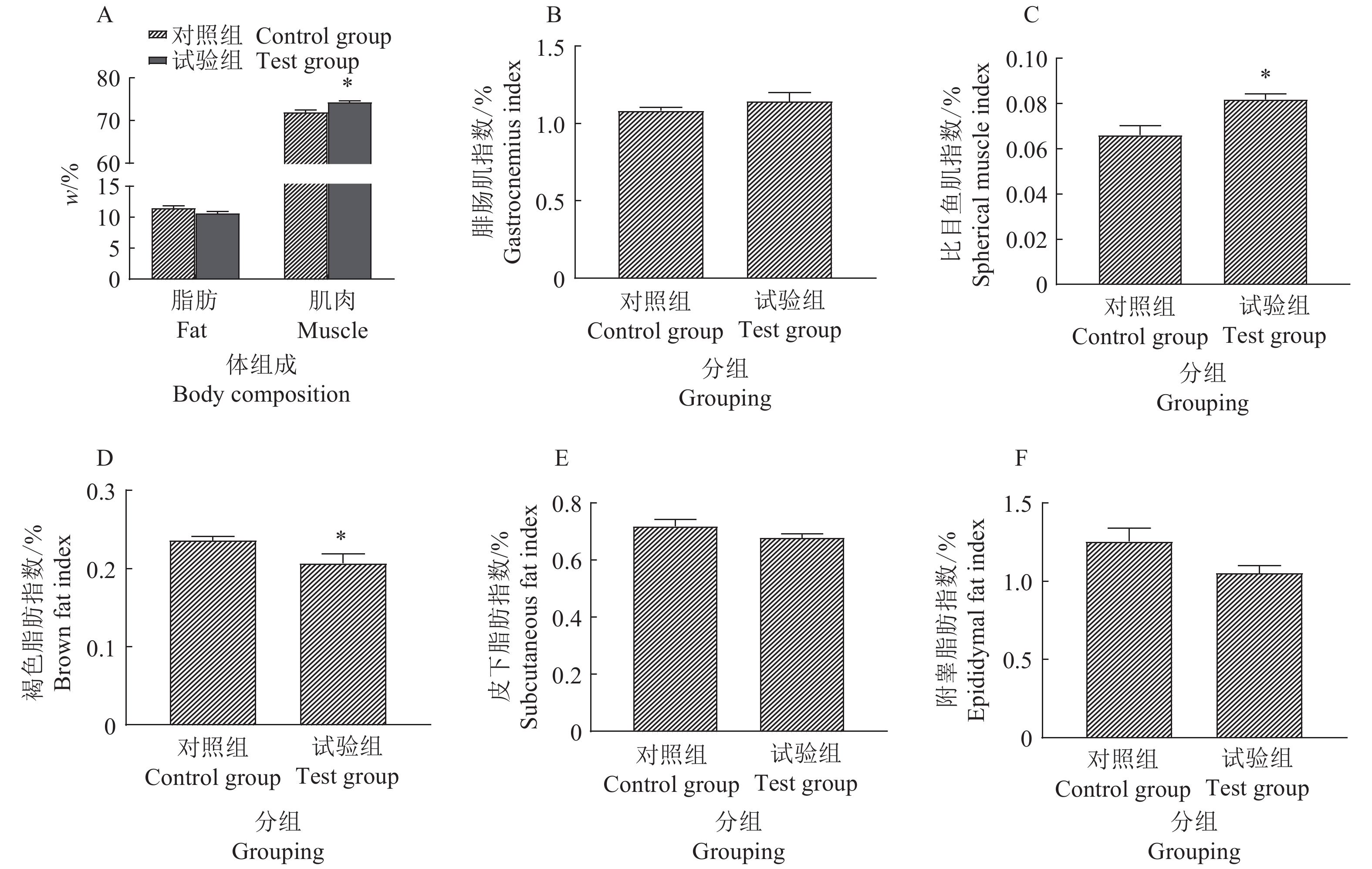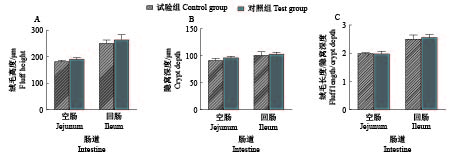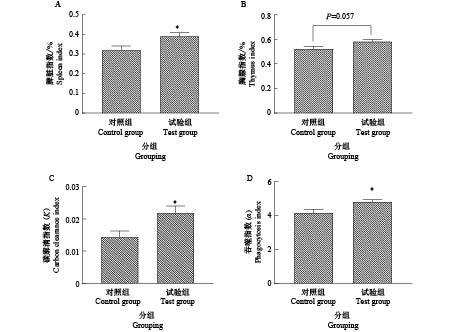Effects of α-ketoglutaric acid produced by solid fermentation on mouse growth, intestinal structure and immune function
-
摘要:目的
筛选固态发酵制备α−酮戊二酸的菌株,研究发酵产物对动物生长、肠道结构和免疫机能的影响。
方法对9种菌株(包括乳酸菌、酵母菌和曲霉菌Aspergillus等)进行发酵,检测发酵物中α−酮戊二酸含量。发酵过程中添加琥珀酸,研究其对α−酮戊二酸产出率的影响。随后,选用16只4周龄C57/BL小鼠,随机分为2组,分别在普通日粮中添加质量分数为5%的普通发酵物和5%的富含α−酮戊二酸发酵物饲喂4周,分析动物采食和生长、肠道结构以及单核−巨噬细胞的吞噬功能和血象。
结果酵母菌固态发酵产生了微量的α−酮戊二酸,枯草芽孢杆菌Bacillus subtilis产生了约60 μg/g的α−酮戊二酸,其余菌株均未检测到α−酮戊二酸。枯草芽孢杆菌固态发酵时添加琥珀酸可促进α−酮戊二酸累积,最高产出率达到0.3%。添加质量分数为5%的靶向α−酮戊二酸发酵产物稍微降低了小鼠体质量和体质量增加(P>0.05),显著增加小鼠的比目鱼肌质量(P<0.05),显著降低小鼠的褐色脂肪质量(P<0.05)。发酵产物对小鼠回肠和空肠的绒毛长度和隐窝深度无显著影响。血象和免疫学指标表明,富含α−酮戊二酸发酵产物能显著降低中性粒细胞百分比,提高淋巴细胞百分比,增加红细胞血红蛋白质量浓度。发酵产物显著增加小鼠单核−巨噬细胞的吞噬功能(P<0.05)。
结论枯草芽孢杆菌在固态发酵过程中添加琥珀酸可使α−酮戊二酸累积,日粮添加富含α−酮戊二酸发酵物能显著增加小鼠肌肉质量,降低脂肪质量,并能显著提高小鼠的免疫机能。
Abstract:ObjectiveTo screen strains for producing α-ketoglutaric acid by solid fermentation, and study the effects of fermentation products on animal growth, intestinal structure and immune function.
MethodNine strains (including lactic acid bacteria, yeast and Aspergillus) were fermented and α-ketoglutaric acid content in the fermentation products was detected. Succinic acid was added during the fermentation to study its effect on the production rate of α-ketoglutaric acid. Subsequently, sixteen 4-week-old C57/BL mice were randomly divided into two groups, 5% normal fermented material or 5% α-ketoglutarate-rich fermented material was added to the common diet for four weeks. Animal feeding and growth, intestinal structure, and phagocytosis and blood picture of monocyte-macrophages were analyzed.
ResultThe solid fermentation of yeast produced a trace amount of α-ketoglutaric acid, Bacillus subtilis produced about 60 μg/g α-ketoglutaric acid, and α-ketoglutaric acid was not detected using other strains. The addition of succinic acid to the solid fermentation of Bacillus subtilis promoted the accumulation of α-ketoglutaric acid with the maximum production rate of 0.3%. Dietary supplementation of 5% targeted α-ketoglutarate fermentation product slightly reduced body weight and body weight gain of mice(P>0.05), significantly increased the soleus muscle weight of mice (P<0.05), and significantly reduced brown fat weight in mice (P<0.05). The fermentation product had no significant effect on the villus length and crypt depth of mouse ileum and jejunum. Blood and immunological indicators revealed thatα-ketoglutarate-rich fermentation product significantly reduced the percentage of neutrophils, increased the percentage of lymphocyte, and increased the content of red blood cell hemoglobin. Moreover, the fermentation product also significantly increased the phagocytic function of mouse monocyte-macrophages (P<0.05).
ConclusionThe addition of succinic acid can promote accumulation of α-ketoglutaric acid in the solid fermentation process of Bacillus subtilis. Adding α-ketoglutarate-rich fermentation in the diet can significantly increase the muscle weight, decrease the fat weight of mice, and significantly improve the immune function of mice.
-
Keywords:
- mouse /
- α-ketoglutaric acid /
- Bacillus subtilis /
- solid fermentation /
- metabolic regulation /
- succinic acid
-
-
表 1 不同发酵物产物对小鼠血常规的影响
Table 1 Effects of different fermentation products on blood routine in mice
检测项目 Test item 对照组 Control group 试验组1) Test group 白细胞总数/(×109·L−1) White blood cell count 7.442±1.343 7.642±0.805 嗜碱性粒细胞百分率/% Percentage of basophils 0.600±0.167 0.480±0.160 嗜酸性粒细胞百分率/% Percentage of eosinophils 1.820±0.397 1.560±0.320 中性粒细胞百分率/% Percentage of neutrophils 24.320±0.694 22.240±0.599* 淋巴细胞百分率/% Percentage of lymphocytes 73.240±0.869 75.700±0.827* 单核细胞百分率/% Percentage of monocytes 1.912±0.084 1.940±0.062 红细胞计数/(×1012·L−1) Red blood cell count 9.758±0.569 9.514±0.218 ρ(血红蛋白)/(g·L−1) Hemoglobin content 142.000±5.967 141.000±3.033 红细胞平均体积/fL Mean corpuscular volume 51.780±1.314 51.200±0.593 红细胞平均血红蛋白质量/pg Mean erythrocyte hemoglobin mass 14.580±0.293 14.840±0.206 红细胞平均血红蛋白质量浓度/(g·L−1) Mean erythrocyte hemoglobin content 281.800±3.763 289.600±3.382* 红细胞分布宽度/% Red blood cell distribution width 16.340±1.848 15.620±0.487 红细胞压积/% Hematocrit 50.460±2.098 48.680±1.225 血小板计数/(×109·L−1) Platelet count 936.000±113.680 960.400±100.661 平均血小板体积/fL Mean platelet volume 6.000±0.141 6.080±0.133 血小板分布宽度/% Platelet distribution width 15.200±0.110 15.140±0.102 血小板比积/% Platelet specific volume 0.561±0.067 0.586±0.063 1)“*”表示与对照组差异显著(P<0.05,t检验)
1)“*” indicates significant difference from the control group (P<0.05,t test) -
[1] YEH S L, LAI Y N, SHANG H F, et al. Effects of glutamine supplementation on innate immune response in rats with gut-derived sepsis[J]. Brit J Nutr, 2004, 91(3): 423-429. doi: 10.1079/BJN20031069
[2] 陈家顺, 苏文璇, 符晨星, 等. α−酮戊二酸的生理功能及其在动物生产中的应用[J]. 动物营养学报, 2018, 30(10): 29-38. [3] CHEN J, SU W, KANG B, et al. Supplementation with alpha-ketoglutarate to a low-protein diet enhances amino acid synthesis in tissues and improves protein metabolism in the skeletal muscle of growing pigs[J]. Amino acids, 2018, 50(11): 1525-1537. doi: 10.1007/s00726-018-2618-3
[4] SPENCER G J, MCGRATH C J, GENEVER P G. Current perspectives on NMDA-type glutamate signalling in bone[J]. Int J Biochem Cell Biol, 2007, 39(6): 1089-1104. doi: 10.1016/j.biocel.2006.11.002
[5] CHIN R M, FU X, PAI M Y, et al. The metabolite alpha-ketoglutarate extends lifespan by inhibiting ATP synthase and TOR[J]. Nature, 2014, 510(7505): 397-401. doi: 10.1038/nature13264
[6] RAIMUNDO N, BAYSAL B E, SHADEL G S. Revisiting the TCA cycle: Signaling to tumor formation[J]. Trends Mol Med, 2011, 17(11): 641-649. doi: 10.1016/j.molmed.2011.06.001
[7] SAUER M, PORRO D, MATTANOVICH D, et al. Microbial production of organic acids: Expanding the markets[J]. Trends Biotechnol, 2008, 26(2): 100-108. doi: 10.1016/j.tibtech.2007.11.006
[8] 郭洪伟, 堵国成, 周景文, 等. 微生物发酵生产α−酮戊二酸研究进展[J]. 生物工程学报, 2013, 29(2): 141-152. [9] 刘艳新, 刘占英, 倪慧娟, 等. 微生物发酵饲料的研究进展与前景展望[J]. 饲料博览, 2017(2): 15-22. doi: 10.3969/j.issn.1001-0084.2017.02.005 [10] MORGUNOV I G, KAMZOLOVA S V, PEREVOZNIKOVA O A, et al. Pyruvic acid production by a thiamine auxotroph of Yarrowia lipolytica[J]. Process Biochem, 2004, 39(11): 1469-1474. doi: 10.1016/S0032-9592(03)00259-0
[11] CHERNYAVSKAYA O G, SHISHKANOVA N V, IL'CHENKO A P, et al. Synthesis of alpha-ketoglutaric acid by Yarrowia lipolytica yeast grown on ethanol[J]. Appl Microbiol Biotechnol, 2000, 53(2): 152-158. doi: 10.1007/s002530050002
[12] LOCKWOOD L B, STODOLA F H. Preliminary studies on the production of alpha-ketoglutaric acid by Pseudomonas fluorescens[J]. J Biol Chem, 1946, 164(1): 81-83.
[13] LIU Y, HUANG J, HOU Y, et al. Dietary arginine supplementation alleviates intestinal mucosal disruption induced by Escherichia coli lipopolysaccharide in weaned pigs[J]. Br J Nutr, 2008, 100(3): 552-560. doi: 10.1017/S0007114508911612
[14] BERGEN W G, WU G. Intestinal nitrogen recycling and utilization in health and disease[J]. J Nutr, 2009, 139(5): 821-825. doi: 10.3945/jn.109.104497
[15] FLYNN N E, BIRD J G, GUTHRIE A S. Glucocorticoid regulation of amino acid and polyamine metabolism in the small intestine[J]. Amino acids, 2009, 37(1): 123-129. doi: 10.1007/s00726-008-0206-7
[16] KRISTENSEN N B, JUNGVID H, FERNANDEZ J A, et al. Absorption and metabolism of alpha-ketoglutarate in growing pigs[J]. J Anim Physiol Ani N, 2002, 86(7/8): 239-245.
[17] HOU Y, YAO K, WANG L, et al. Effects of alpha-ketoglutarate on energy status in the intestinal mucosa of weaned piglets chronically challenged with lipopolysaccharide[J]. Br J Nutr, 2011, 106(3): 357-363. doi: 10.1017/S0007114511000249
[18] HOU Y, WANG L, DING B, et al. Dietary alpha-ketoglutarate supplementation ameliorates intestinal injury in lipopolysaccharide-challenged piglets[J]. Amino acids, 2010, 39(2): 555-564. doi: 10.1007/s00726-010-0473-y
[19] PARRY-BILLINGS M, EVANS J, CALDER P C, et al. Does glutamine contribute to immunosuppression after major burns[J]. Lancet, 1990, 336(8714): 523-525. doi: 10.1016/0140-6736(90)92083-T



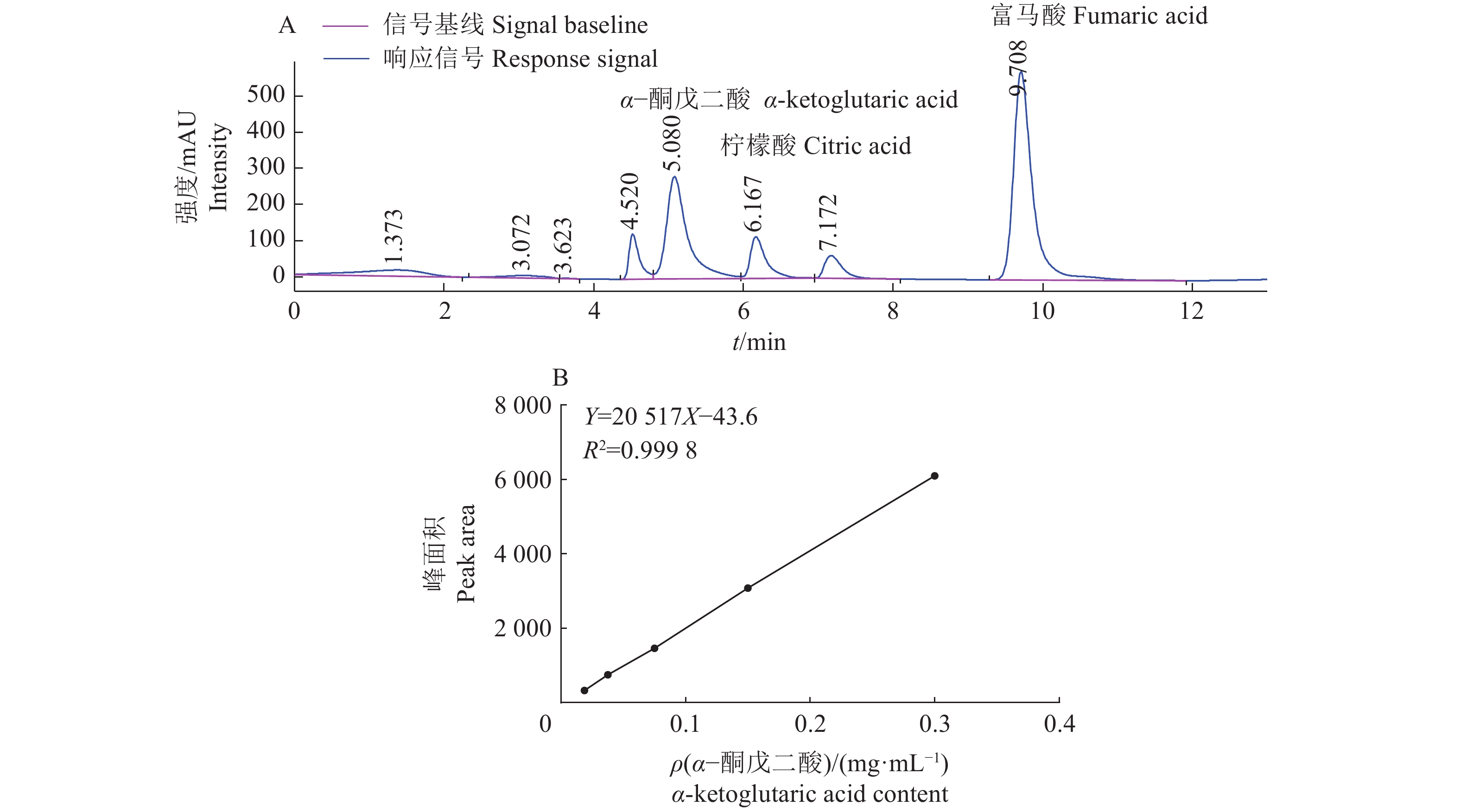
 下载:
下载:
